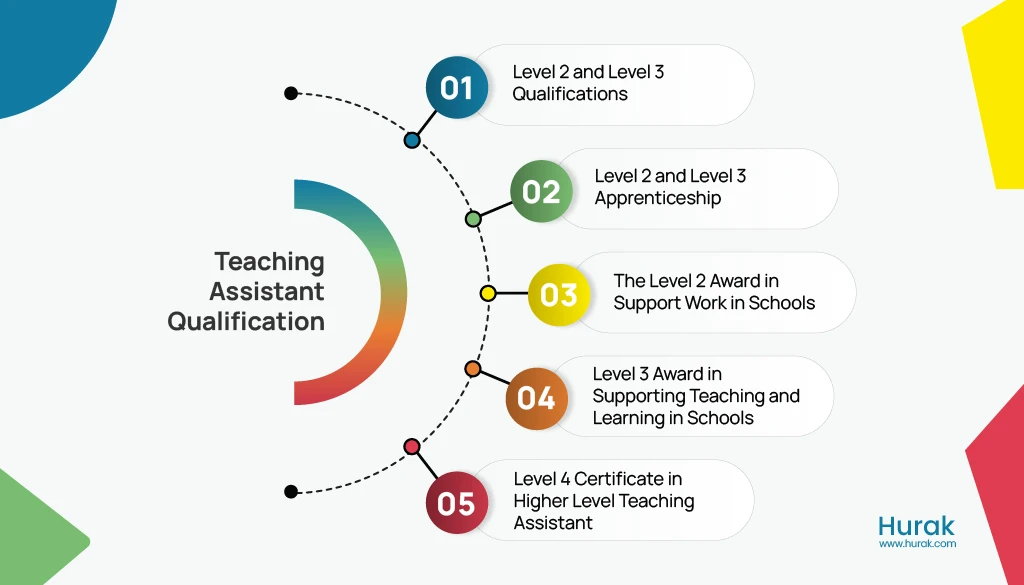Being a teaching assistant is a challenging yet rewarding role. It doesn’t necessarily require any specific qualifications but increases one’s chances of getting a job. Obtaining teaching assistant qualifications will help one learn more, develop one’s skill set, and get better opportunities.
This blog gives you an overview of various teaching assistant qualifications.
Which Qualifications Do I Need to Become a Teaching Assistant?
There is no standard requirement in the UK to become a TA, as each institute decides these requirements on its own. Some institutions can accept your job application without relevant qualifications. However, the teaching assistant role is very competitive, and candidates with nationally recognised teaching assistant qualifications are more likely to get the job.
Who are Teaching Assistant Qualifications Aimed at?
Teaching assistant qualifications are designed for individuals looking to begin their careers as teaching assistants or already serving in this role. These qualifications help them refresh their knowledge and develop their careers further.
Most Popular Teaching Assistant Qualifications
If you want to begin a career as a teaching assistant, you will only require fundamental literacy skills, usually GCSE or equivalent (National 4 or 5 qualifications in Scotland) in maths or English. You must also have experience working with kids.

Even though having a degree isn’t mandatory to be a teaching assistant, it can significantly impact your resume. It shows that a candidate is competent and has gained the skills to get this role.
The following qualifications help learners to understand the knowledge and skills required to work in this role. However, obtaining these qualifications is optional.
Level 2 and Level 3 Qualifications
The Level 2 and Level 3 teaching assistant qualifications are suitable for individuals wishing to begin their career as a teaching assistant or new to this field. However, it requires you to either be already working in this role or have a practical placement in a school environment.
Level 2 and Level 3 Apprenticeship
Here’s another pathway to getting training to be a teaching assistant: opt for a Levels 2 or 3 intermediate or advanced apprenticeship. During this training, you will work in an institute and will receive a salary.
The Level 2 Award in Support Work in Schools
The Level 2 Award in Support Work in Schools is an entry-level teaching assistant qualification that you can enrol in with no prior experience. It covers the fundamental topics related to supporting children in a school.
Level 3 Award in Supporting Teaching and Learning in Schools
The Level 3 Award in Supporting Teaching and Learning in Schools can also be completed without a school placement. It is a more advanced qualification than the Level 2 award. This higher-level teaching assistant qualification will give you more recognition by employers. However, it takes longer to complete.
Level 4 Certificate in Higher Level Teaching Assistant
The Level 4 Certificate in Higher Level Teaching Assistant is one of the advanced level teaching assistant qualifications. To enrol on this qualification, you must demonstrate your experience in a teaching assistant role. If you wish to get appointed to more advanced roles, this qualification helps you to develop certain skills and knowledge to make you eligible for those roles.
Skills Required to be a Teaching Assistant
You must have:
- a positive approach to working with children
- strong regard for children’s well-being
- respect for diversity
- communication and interpersonal skills
- reading, writing and numeracy skills
- excellent teamwork skills for working with others
- creative ability
- patience
- a flexible approach to work
- organisational skills
- a professional attitude to work
Speaking the local language fluently may be advantageous when working with students who are learning English as a second language (EAL). First aid, Makaton, and British Sign Language proficiency are a few other useful skills.
Work Experience
Prior experience will be helpful when trying to get a job as a teaching assistant. Work experience could include positions in:
- childcare and educational environments
- nurseries
- sports-related activities
- summer programmes
- working as a youth tutor
Even though few formal programmes are available for job experience, many schools accept inquiries for volunteer work. Make direct contact with them and tell them about your professional goals and the causes you would like to support, such as after-school clubs, IT, or literacy.
If you’re unsure, check with employers. Degrees in education, youth work, and childhood studies that include practical placements should be considered experience. Participating in your university’s student ambassador role might provide additional beneficial experiences.
Career Prospects After Completing Teaching Assistant Qualifications
You can advance through the grades as a teaching assistant, starting at entry level and ending at HLTA. Gaining experience, obtaining the necessary certifications, and receiving training will help you advance.
You’ll assume more responsibilities as you go. You will be responsible for lesson preparation, creating support materials, and giving unsupervised instruction at the HLTA level. It’s possible that you’ll also have to help out other TAs.
You can also coordinate activities in specialised curricular learning or assistance areas, such as SEN, literacy, or IT.



